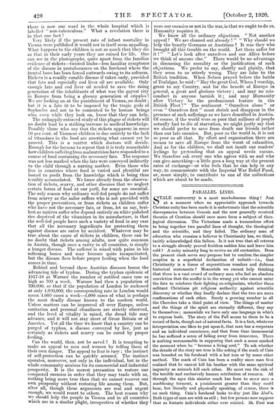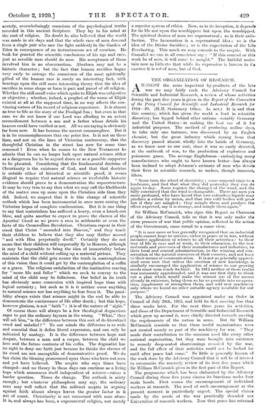PARALLEL LINES.
CI TALE controversy is a most unwholesome thing ! Just
at a moment when an appreciable approach towards Christian unityhas been made it is unfortunate that the scientific discrepancies between Genesis and the now generally received theories of Creation should once more form a subject of theo- logical discussion. The Victorians made a tremendous effort to bring together two parallel lines of thought, the theological and the scientific, and they failed. The ordinary man of education who remains a believer in Christianity has, we think, tacitly acknowledged this failure. Is it not true that all returns to a struggle already proved fruitless sadden him and leave him cold ? A noisy minority long to revive an old contention. Does the present dash serve any purpose but to confirm the simpler sceptics in a superficial declaration of unfaith—i.e., that Christianity is a tissue of superstitious wonders and dubious historical statements ? Meanwhile we cannot help thinking that there is a vast crowd of ordinary men who feel an absolute conviction that the scoffer is in the wrong yet who cannot enter the lists to reinforce their fighting co-religionists, whether these militant Christians pit religious authority against scientific discovery or whether they loudly declare that the two are mere confirmations of each other. Surely a growing number in all the Churches take a third point of view. The things of matter and the things of the spirit are eternally different, they say to themselves ; meanwhile we have only one language in which to express both. The story of the Fall seems to them to be a record of facts, though not of natural facts. It is a fact, whatever interpretation one likes to put upon it, that man has a corporate and an individual conscience, and that from time immemorial he has suffered a sense of falling away from innocence. Thera is nothing unreasonable in supposing that such a sense marked the moment when he " became a living soul." To ask whether the details of the story are true is like asking if the mark of Cain was branded on his forehead with a hot iron or by some other method. The mark of Cain has been a reality since man first realized that he cannot kill his brother with the same spiritual impunity as animals kill each other. He must run the risk of the terrible and exclusively human retribution of remorse. All through the ages this sinister mark has been to some men a maddening torment, a punishment greater than they could bear, but literally and physically speaking, of ecurse, there is no such thing. Cain's forehead looks to-day just like Abel's. Both types of men are with us still ; but few persons now suppose that as historic individuals either ever existed. St. Paul was acutely, overwhelmingly conscious of the psychological truths recorded in this ancient Scripture. They lay to his mind at the root of religion. No doubt he also believed that the world was made in six days and that the whole race of men descend from a single pair who saw the light suddenly in the Garden of Eden in consequence of an instantaneous act of creation. He took for granted the scientific conclusions of bin ago and race, just as sensible men should do now. His acceptance of them involved him in no obscurantism. Abraham may not be a historic character ; but the fact that human sacrifice began very early to outrage the conscience of the most spiritually gifted of the human race is surely an interesting fact, with bearings upon the still more interesting theory that the idea of sacrifice in some shape or form is part and parcel of all religion. Whether the still small voice which spoke to Elijah was subjective or objective ; whether, indeed, a prophet of the name of Elijah existed at all at the supposed time, in no way affects the con- vincing nature of his record of religious experience. It is almost as true to life as the story of the Prodigal Son ; but even in that case we do not know if our Lord was alluding to an actual reconcilement between a son and a father whose details his hearers could have verified or not. All we are saying is obviously far from new. It has become the merest commonplace. But it is in its commonplaceness that our point lies. Is it not on these lines, and not on the lines of Victorian controversy, that the thoughtful Christian in the street has now for some time reasoned / Even when he comes to tho New Testament he admits that he can no longer look upon natural science either as a dangerous foe to be argued down or as a possible supporter to be placated. Considering that the fundamental doctrine of Christianity is the existence of God, and that that doctrine is outside either of historical or scientific proof, it seems illogical to require that natural science or irrefutable historic evidence should prove to a demonstration the superstructure. It may be very true to say that what we may call the likelihoods of the matter sum up more upon the Christian side than they did. Indeed, we suspect that it is this change of scientific outlook which has been instrumental in once more raising the Victorian hopes of complete confirmation. But it is one thing to say that materialism has suffered a heavy, even a knock-out blow, and quite another to expect to prove the clauses of the Apostles' Creed as we prove a sum in arithmetic or even the facts of the Cromwellian Revolution. Christians repeat in their creed that Christ " ascended into Heaven," and they teach their children to believe that they also may thither ascend " and with Him perpetually dwell." Certainly they do not mean that their children will corporeally fly to Heaven, although it may be impossible to bring the idea of immortality before the mind of a child without calling up a material picture. They maintain that the child gets nearer the truth in contemplation of this vision than it could get by the contemplation of a coffin or a grave. The religious satisfaction of the instinctive craving for "more life and fuller" which we seek to convey to the mind 14 the child may be fallacious. Our belief in its truth has obviously more connexion with inspired hope than with logical certainty ; but such as it is it neither owes anything to natural science nor has anything to fear from it. The possi- bility always exists that science might in the end be able to demonstrate the continuance of life after death ; but this hope, however glorious, is not " faith " : it is of the nature of " sight."
Of course there will always be a few theological dogmatists eager to put the ordinary layman in the wrong. " What," they will ask him," is the difference between this sort of de-literalize) creed and unbelief ? " To our minds the difference is so wide and essential that it defies literal expression, and can only be indicated by analogy. It is the difference between hope and despair, between a man and a corpse, between the child we love and the future contents of his coffin. The dogmatist has no right to deny our faith just because he thinks the clauses of its creed are not susceptible of demonstrative proof. We do but claim the blessing pronounced upon those who have not seen and yet have believed. The sceptic who says times have changed—and no theory in these days can continue as a living hope which announces itself independent of science—raises a harder question. Times do change. The outlook is misty enough ; but whatever philosophers may say, the ordinary man may well reflect that the militant sceptic in arguing against faith almost always leaves tho greater factor in it out of count. Christianity is not concerned with man alone. It is, and always has been, a supernatural religion, not merely
a superior system of ethics. Now, as in its inception, it depends for its life not upon the worshippers but upon the worshipped. The spiritual desires of man are supernatural ; so is their satis- faction. Tho Incarnation is a supernatural idea ; so is the idea of the Divine Sacrifice ; so is the expectation of the Life Everlasting. This much we may concede to the sceptic. With Gamaliel we can in all conscience say : " If this counsel or this work be of men, it will conic t3 naught." The faithful main- tain now as hitherto that while its expression is human in its essence it is not of men, but of God.



































 Previous page
Previous page